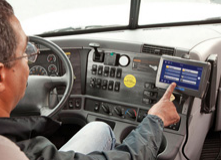Preparing for HOS: The Imperatives before the Mandate
Exclusive to Fleet News Daily by Dave Kraft, Director of Industry Affairs, Omnitracs, Inc. , a Qualcomm company: On July 1, the Federal Motor Carrier Safety Association (FMCSA) is poised to implement the new Hour of Service rules.
These impending changes have been public knowledge for more than a year, but as the official date draws closer you still may find yourself asking—what does this mean for me as a driver, fleet manager or owner?
First, let us review the changes at a basic regulatory level. Some guidelines, in fact, will not change. For example, there won’t be a change in the 11 hour driving and 14 hour on-duty limits, or a change to the 60/70 on-duty limits. However, notable changes will include the following:
- The 34 hour reset will become a weekly reset, with at least 34 hours off once per seven days that includes two consecutive periods off between 1:00 a.m. – 5:00 a.m.
- A required 30-minute rest break per eight hours on duty
The new rules will be more restrictive and require supplementary monitoring to guarantee compliance and operational efficiency. So, regardless of your role in a fleet—driver, owner or fleet manager—these changes will impact you. For owners, a significant concern will be preventing a dip in productivity; as your company transitions to accommodate new regulations, you’ll have to adjust fleet management and operations to ensure everything continues to run at optimal schedules. For fleet managers and drivers alike, scheduling complexity could increase and preventative measures will need to be taken to avoid violations that impact Compliance Safety Accountability (CSA) scores.
 To best manage compliance with the new rules and guarantee a hassle free transition, fleets must pre-emptively execute a new strategy—keeping ahead of the curve to reduce compliance issues and iron out complications. It’s also an ideal time to embrace new technology available to fleets to further streamline HOS management, such as electronic on-board recorders (EOBRs) and electronic logs (eLogs).
To best manage compliance with the new rules and guarantee a hassle free transition, fleets must pre-emptively execute a new strategy—keeping ahead of the curve to reduce compliance issues and iron out complications. It’s also an ideal time to embrace new technology available to fleets to further streamline HOS management, such as electronic on-board recorders (EOBRs) and electronic logs (eLogs).
eLogs can help monitor hours and rest periods, optimize on-duty weekly limits and reduce administrative costs. Further, compared to traditional paper logs, elogs can reduce errors and improve driver productivity by automating the process. Some electronic logging software—including Omnitracs’—even provides in-cab alerts to warn drivers and fleet managers of impending violations, which will be a key asset during the transition. Realizing the impact this will have on carriers and drivers alike, Omnitracs has made it easy to take pre-emptive measures through enhancements to its HOS application, which can be activated over-the-air, as soon the new rules come online.
Wondering if the HOS rule changes will affect you is a good first step, but now it’s time to be proactive in minimizing the negative impacts that could occur—start transitioning early and make sure to evaluate and leverage technology on the market.
About the Author: Dave Kraft
As Director of Industry Affairs, Dave leads participation in industry standards organizations and in monitoring of regulatory and legislative developments for Omnitracs, Inc., a Qualcomm company. Dave’s participation in industry associations includes: American Trucking Association (ATA), Commercial Vehicle Safety Alliance, ITS-America, National Private Truck Council, Telecommunications Industry Association (TIA), and others. He currently serves as chairman for ATA’s Technology and Maintenance Council EOBR task force in developing industry guidelines for electronic onboard recorders. Dave also serves as the vice-chairman of the TIA TR-48 Engineering Committee for Vehicle Telematics. Dave has recently served as a subject matter expert with the Motor Carrier Safety Advisory Committee’s EOBR Subcommittee in defining recommended technical guidelines for future EOBR rule making.
Dave has over 30 years of information and communications technology (ICT) experience, including leadership of large scale technology initiatives and senior level management of ICT services organizations.
Kraft holds a bachelor’s degree in mathematics and economics from the University of Wisconsin and a master of business administration degree from DePaul University.
 More here about Omnitracs.
More here about Omnitracs.
Category: Fleet Diagnostics & Software, General Update, Management











